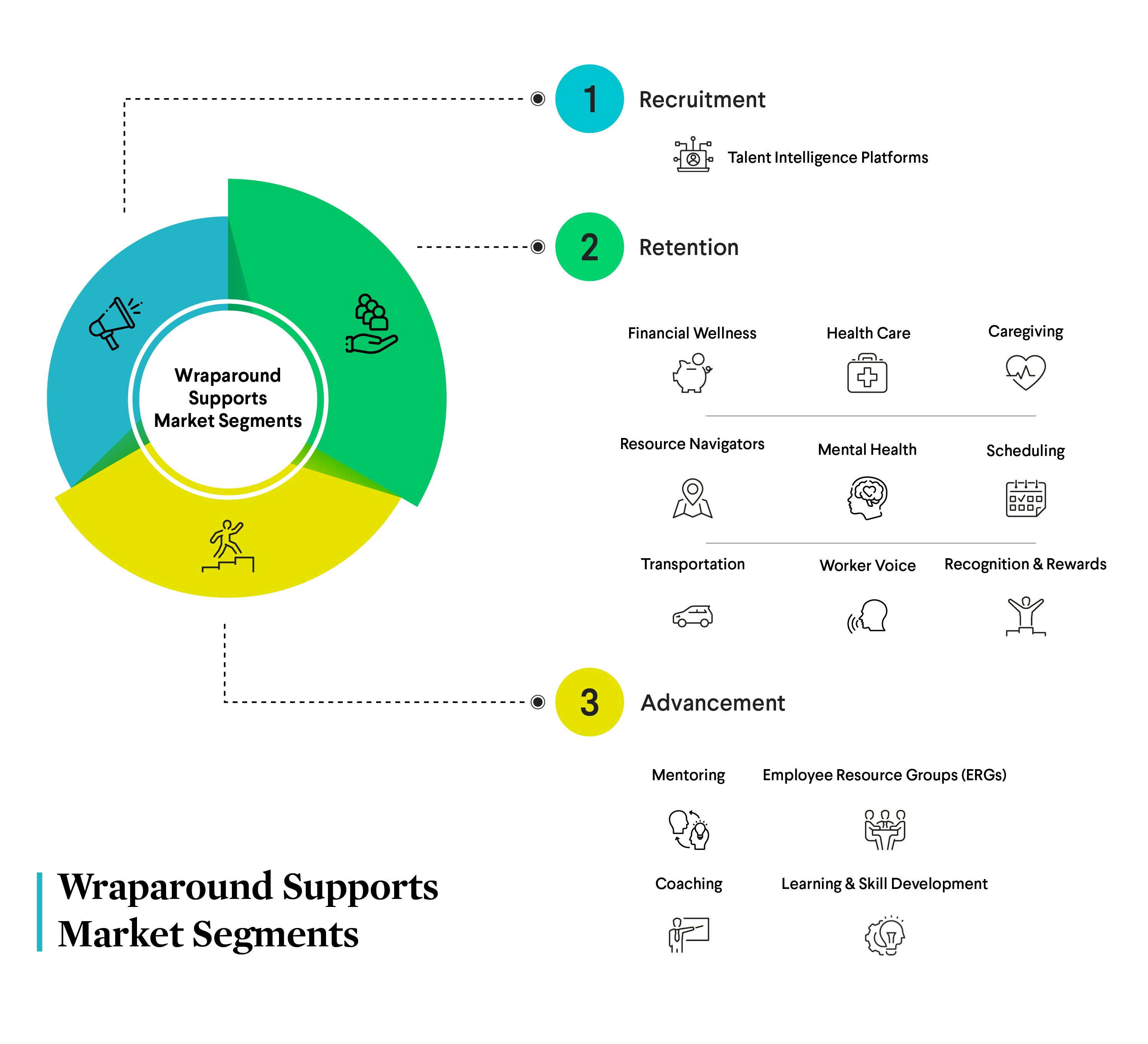Innovative Wraparound Support Solutions That Help Workers Succeed
An in-depth scan of the market of solutions employers can use to expand employee access to wraparound supports that remove barriers to success on the job.

The U.S. workforce is growing increasingly diverse. It’s estimated that by 2045, half of the adults living in the United States will be individuals who identify as people of color, with 13% of adults identifying as Black. For the country to remain economically competitive, people of all backgrounds must have opportunities to make significant contributions to the evolving labor market. The gains could be substantial: The U.S. Chamber of Commerce estimates that closing the racial equity gap could generate $8 trillion in U.S. GDP growth by 2050.
But that won’t happen if things don’t change. Currently, millions of people aren’t able to fully participate and succeed in education, training, and well-paid employment opportunities in part because they lack access to foundational resources such as housing, health care, child care, and transportation.
Employers can play a pivotal role in ensuring that workers have opportunities to harness all of their talents and thrive at work if they connect employees to a comprehensive array of wraparound supports that enable them to manage challenges that prevent them from succeeding on the job and advancing in their careers.
This Jobs for the Future (JFF) market scan report takes an in-depth look at innovative products, services, and resources that employers can use to improve and expand the supports they offer employees and thereby ensure that they can tap into the full potential of the U.S. workforce. And that would include making the most of contributions from the more than 21 million Black workers in this country, because research by JFF and others indicates that Black people are disproportionately affected by lack of access to essential supports.
This research is a valuable resource for employers seeking to stand out by reimagining their recruitment, retention, and advancement strategies by offering wraparound supports. Our findings also offer valuable insights for investors, policymakers, and other stakeholders interested in supporting innovative approaches to advancing workplace equity.
Key Findings
These are the most powerful insights that emerged from our research:
- Employers need to understand the factors such as lack of access to health care, child care, and transportation that limit Black workers’ access to quality jobs and economic advancement opportunities.
- Employers can position themselves for sustained success by offering programs and services that enable employees to manage the circumstances and challenges that limit their ability to succeed at work. These efforts can lead to improvements in employee retention and productivity rates and yield valuable returns over time.
- Existing and emerging technologies are enabling new and innovative ways to provide wraparound supports that deliver personalized benefits for workers but can be scaled to serve entire organizations or broader populations.
- Organizations that want to promote long-term career advancement opportunities for Black workers should offer supports that facilitate skill-building and networking, which can expand people’s professional social capital.
Understanding the Landscape
The Black worker experience is a diverse and complicated interplay of factors, including socioeconomic disparities, systemic barriers to career success, and ongoing efforts to address racial inequities in the workplace. Despite recent improvements in upward mobility, Black workers must still overcome numerous challenges in order to fully participate and succeed in today’s labor market. This illustrates how important it is for employers to take the time to understand the complex and varied circumstances every one of their employees experiences in the workforce. Only then will they be able to identify the wraparound support solutions that will give Black workers and others who face systemic barriers the best chances of success.
-
What we learned:
- Black workers made progress amid economic recovery
- Black workers still face systemic barriers to success in today’s labor market
- Supporting and advancing Black workers makes business sense
-
What to know:
- Spending on HR technology, which includes smart recruitment and employee feedback systems, has grown significantly.
- The average large company has more than 80 employee-facing systems, and this number has increased by more than 40% over five years.
- Innovators have opportunities to develop tools and technologies that offer personalized solutions tailored to individual workers, deliver measurable results, and can be deployed at scale to serve large populations of workers.
The Market Today
Employers increasingly seek automated, data-driven, employee-facing systems, programs, and services that can be integrated with other platforms. The shift to remote and hybrid work models, fierce competition for talent, and changes in employee expectations of the types of benefits and working conditions employers should offer are key factors fueling increased spending and growth in this area.
Market Segments
Through our research, we gained clearer insights into how offering wraparound supports, or connecting workers to them via partnerships with community organizations, enables employers to improve their talent management practices and expand economic advancement opportunities for their employees. Based on what we learned, we divided the market into three key categories related to the stages of a worker’s career journey: recruitment, retention, and advancement.
As we reviewed the array of products, services, and resources in this marketplace, we assigned the offerings to categories based on the way they support workers and drive improvements in business outcomes for employers. In some cases, solutions could fall into more than one category.
Within the segments of recruitment, retention, and advancement, we identified sub-segments that address aspects of a worker’s experience, both inside and outside of work, that significantly impact their engagement and performance on the job.

Trends
- There’s a greater emphasis on offering wraparound supports that promote opportunities to build professional social capital because they have a positive impact on the long-term career advancement prospects of Black workers.
- Using AI-driven tools responsibly and ethically has the potential to help organizations create more dynamic, adaptive, and supportive work environments.
- The need for cloud-based systems and mobile applications will grow.
- As the number of solutions designed to promote worker well-being grows, employers will be looking for tools that help employees navigate their support options as a way to maximize the value of the benefits for workers.
- As providers strive to offer comprehensive solutions that streamline HR operations and address the evolving needs of workers, we expect to see increases in both provider consolidation and integration of disparate systems.
- Employers say it’s difficult to recruit Black talent to fill entry-level jobs without diverse management teams, and it’s difficult to diversify at higher levels without many Black workers in entry-level positions.
Innovators to Watch
Thousands of organizations offer technologies and solutions that help expand workers’ opportunities to pursue high-wage jobs in high-growth industries by eliminating disparities in access to basic services that people rely on in their daily lives. After a careful scan of that broad marketplace, we selected nine cutting-edge organizations as Innovators to Watch. You can read about them in this special JFF report.
Our Opportunity
Employers play a crucial role in shaping the experiences of Black people as they enter the workforce and pursue careers. In a rapidly evolving economy and a rapidly diversifying workforce, it’s essential for employers to support Black workers as whole individuals and ensure that they have access to wraparound supports that enable them to manage and overcome challenges and succeed on the job.
Employers must consider how factors like lack of access to transportation, child care, elder care, health care, mental health services, and more can affect every worker’s ability to both arrive at the workplace and thrive in their careers.
Black workers represent an untapped pool of talent that can drive innovation in the workplace and help employers develop products and services that reflect the needs and interests of an evolving customer base.
Companies that provide all employees with supports to ensure that they have access to the services and resources they need to succeed at work can have a positive impact on the worker, the company, and the economy.
Learn More About the Innovators to Watch
Download this JFF report to read profiles of nine organizations that are leading the way.

"Understanding systemic hurdles Black workers face in jobs is vital for employers. Addressing social determinants of work fosters an environment of equity among employees, which has been linked to improved productivity, employee satisfaction, and overall company-level economic success."
Angela Jackson, Founder, Future Forward Institute

KEY PARTNER


















